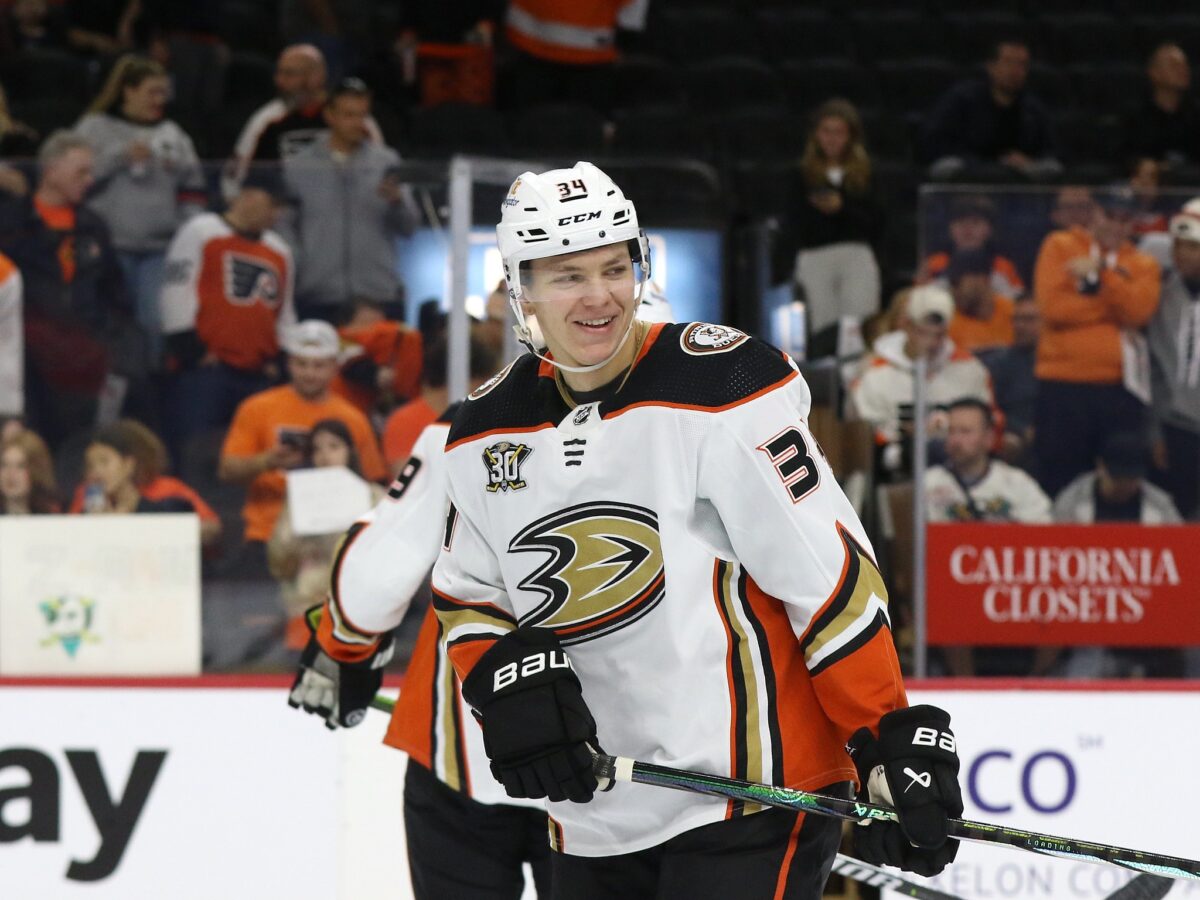Against a surging Tampa Bay Lightning squad that was down Brayden Point, Viktor Hedman, and Andrei Vasilevskiy, the Anaheim Ducks had a chance to collect back-to-back wins for the first time since they did so against the San Jose Sharks and New Jersey Devils on Feb. 29 and March 1, respectively. The Ducks hung tough and gave the Lightning fits, but couldn’t complete the job and fell in quick and heartbreaking fashion in overtime.
Notable in this game was the presence of Leo Carlsson, who suited up and turned out to be no worse for wear following a dangerous-looking knee-on-knee collision against the Chicago Blackhawks (March 22). That’s a huge break for the Ducks. What looked like a potential season-ending and offseason-altering injury was not so, and hockey gods willing, Ducks fans will get to watch Carlsson, and several other youngsters, be featured pieces of the offense over the final 11 games of the season.
Related: Ducks’ Goals for Final Games of the 2023-24 Season
For now, let’s look at the takeaways from the overtime loss, the Ducks’ second straight game with a point.
Active Defense Bottled Up the Lightning
The Lightning are dangerous. Even without critical pieces Brayden Point and Victor Hedman, they still had Nikita Kucherov, who has been red hot lately and surpassed Nathan MacKinnon in the NHL scoring race, which seemed impossible at one point. Steven Stamkos is still a huge threat, and trade deadline newcomers Anthony Duclair and Matt Dumba have been effective. You are not going to stop these players by sitting back and playing passive defense, as the Ducks have done so often before. And to their credit, they didn’t.
The Ducks played active defense. They controlled gaps, particularly in the neutral zone, pinched effectively, gave Kucherov and others minimal space to work and make plays, and played a smart penalty kill that was on point for all three of the Lightning’s chances. Defensively, they brought what was required to give them a chance to win.
Ducks Got Big Nights From Unlikely Bottom-Six Players
Working in concert with the solid defensive game plan was the offensive contributions from unlikely sources. On a night where top-six forwards got chances but couldn’t convert, it was the bottom-six that got the Ducks on the board, and tied it up, in the third period. Ross Johnston got his first goal of the season, and Pavel Mintyukov, who has had an impressive rookie campaign, got his fourth (first since Feb. 15 against the Ottawa Senators). Brett Leason, Max Jones, Jakob Silfverberg, and Ben Meyers collected assists on a great night from depth players that have struggled to hit the score sheet of late.

These games are just as important for these players as they are for the top-six. While we generally understand who will be representing the top two lines for the Ducks next season and beyond, the bottom-six forward group is much murkier, especially when you consider how many are on expiring contracts. That list includes Silfverberg, Jones, Leason, Isac Lundestrom, Meyers, and Bo Groulx. While no lineup decisions for next season will be made now, leaving a lasting positive impression is in everyone’s best interest. These guys did that last night.
Lack of Power Play Success Is Hurting the Ducks
On a night when you are able to hold the vaunted power play unit of the Lightning scoreless, you must find a way to score on your own power play chances. The Ducks failed to do so. And it’s really concerning.
Lately, the Ducks have rolled out units that were clearly and obviously distinguishable as primary and secondary units. The primary unit commonly consisted of Olen Zellweger, Troy Terry, Leo Carlsson, and Mason McTavish, while the secondary included Cam Fowler, Ryan Strome, Alex Killorn, and Frank Vatrano. The fact of the matter is, both units couldn’t score. So what do you do when you’re in a funk like that? You change things up. Unfortunately, it didn’t work.
You may also like:
- Ducks’ 2024-25 Bounce Back Candidates: Trevor Zegras
- Red Wings Should Still Pursue John Gibson Trade
- Anaheim Ducks Logo History
- Ducks News & Rumors: LaCombe, Vatrano, Sennecke & More
- Top Contenders for 2025 Calder Trophy
Granted, the Lightning did as the Ducks did, and shut them down by playing active, effective, and physical defense. The combination on the Ducks’ side didn’t matter. Dump the puck off to Terry in the neutral zone so he could bring it into the zone with speed? Didn’t matter. Move the puck around until you find a chance to get it to Vatrano for a one-timer? Didn’t matter. The Ducks just don’t have it on the man advantage right now, and this was a night they really could have used it. The lack of success on the 60-second five-on-three was especially painful. Coach Greg Cronin acknowledged as much in his postgame comments, but expressed optimism that power play success was cyclical and that the Ducks were not far off from finding success.
There Are Positives for the Ducks to Build Upon
All told, the Ducks picked up a point for the second straight game which is not something they do often. What’s more, is that they contained a dangerous Lightning forward group, and got solid performances out of depth guys, not to mention Mintyukov, who is quietly in striking distance of a half-point-per-game pace as a 20-year-old rookie (four goals, 24 assists in 60 games), which is an impressive feat. Let’s take this chance to appreciate those small victories. And, of course, the biggest victory of the night, which is that Carlsson appears healthy and available for the season’s final stretch.
The Ducks now hit the road for a back-to-back set with the Seattle Kraken. Game 1 of the mini-series is Tuesday at Climate Pledge Arena at 7 PM.
